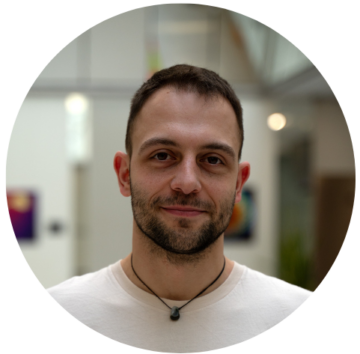Venue : Centre Broca Nouvelle-Aquitaine
Zoom link : https://u-bordeaux-fr.zoom.us/j/84597286282?pwd=VmsyUzhiNld3TC9JOTdDNWV1R2tpQT09
Nikolaos Vardalakis
Team : Neurostimulation and Digital Therapies
IMN
Thesis directed by Fabien Wagner
Title
A computational and technological framework to investigate the effects on neural oscillations of hippocampal electrical stimulation for memory disorders.
Abstract
Episodic memory plays a crucial role in our daily lives. Its performance has been shown to correlate with oscillations in the theta and gamma ranges in the hippocampal formation. Additionally, disruption of these oscillatory rhythms, especially their phase-amplitude coupling, is associated with various memory impairments. Recent studies indicate that neurostimulation of the hippocampal formation can modulate memory processes, but the underlying mechanisms remain unclear and different protocols have yielded conflicting results. In my doctoral thesis, I have established novel computational and neurotechnological approaches to investigate the effects of neurostimulation on theta-gamma oscillations in silico and in non-human primates (NHP), with the ultimate goal to better understand these mechanisms and optimize neurostimulation protocols for alleviating memory deficits in pathologies such as Alzheimer’s disease and brain injury. To this end, I first developed a novel computational model of the hippocampal formation using Hodgkin-Huxley neurons that received theta inputs from a set of phase oscillators representing the medial septum. These so-called Kuramoto oscillators were designed to exhibit theta phase reset. I found out that under certain conditions, a single stimulation pulse could switch the network behavior from non-oscillatory to a state producing theta-nested gamma oscillations. This apparent bistability could have implications on the ability of a single pulse to influence network behavior and associated functions. I also investigated how to restore weakened theta-nested gamma oscillations using open-loop or closed-loop stimulation, both in the presence and absence of phase reset. I discovered that closed-loop stimulation protocols, where stimulation is triggered in real-time based on the phase of the underlying theta rhythm, would be most useful when the phase reset mechanism is relatively limited. In parallel, I contributed to the development of a novel experimental platform for combined electrical recordings and stimulation in NHPs trained to perform a paired associates learning task. We developed a novel neuroprosthesis comprising two depth macroelectrodes (8 contacts each), targeting the entorhinal cortex and the hippocampus, and a custom-made electrocorticographic subdural array (50 contacts) targeting the prefrontal cortex. We collected data in the form of local-field potentials (LFPs) under freely-behaving conditions as well as under anesthesia in response to electrical stimulation of the prefrontal cortex and hippocampal formation. In order to assess the functional connectivity between the target areas, I developed software and hardware to deliver stimulation at a low frequency (1 Hz) and simultaneously record cortico-cortical evoked potentials. These two contributions open new avenues for studying the effects of hippocampal neurostimulation. The computational model allows for in silico experiments, targeting specific phases of ongoing theta oscillations and specific subparts of the hippocampal formation while the technological framework, with its novel hardware and neurosurgical approaches, allows for simultaneously probing multiple nodes of the episodic memory network in NHPs. The combination of these advances is an important step towards developing a closed-loop neuroprosthesis to enhance episodic memory.
Key words
Hippocampus, neural oscillations, computational modeling, non-human primates, neuroprostheses, neurostimulation
Publications
- A dynamical computational model of theta generation in hippocampal circuits to study theta-gamma oscillations during neurostimulation; Nikolaos Vardalakis, Amélie Aussel, Nicolas P. Rougier, Fabien B. Wagner; eLife. 2023-02-14; doi:10.7554/eLife.87356.3
- Neuroprosthetics: from sensorimotor to cognitive disorders; Ankur Gupta, Nikolaos Vardalakis, Fabien B. Wagner; Comm Biol. 2023-01-06; doi: 10.1038/s42003-022-04390-w
Jury
Dr. Laure BUHRY, Maîtresse de conférences Université de Lorraine Rapporteure
Dr. Nanthia SUTHANA, Associate Professor UCLA Rapporteure
Dr. Boris GUTKIN, Directeur de recherche CNRS, ENS – PSL Examinateur
Dr. Timothée LEVI, Professeur des universités Université de Bordeaux Examinateur
Dr. Nicolas ROUGIER, Directeur de recherche Inria, Université de Bordeaux Membre invité
Dr. Fabien WAGNER, Chargé de recherche CNRS, Université de Bordeaux Membre invité

